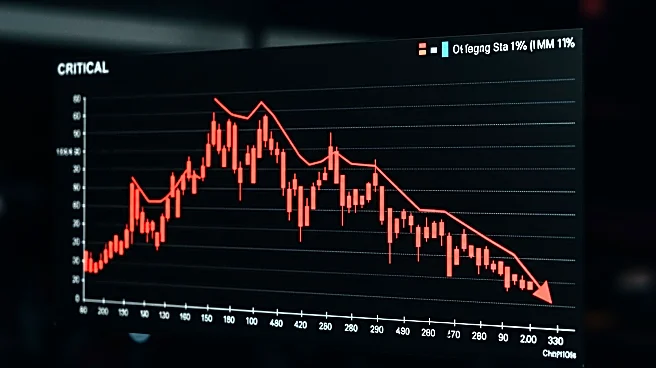What's Happening?
On Tuesday, U.S. stock markets experienced a decline, primarily driven by losses in major technology stocks. The Nasdaq Composite fell by approximately 1.5%, influenced by significant drops in companies like Palantir, which plunged 9%, and AMD, which slid over 5%. Nvidia also saw a decrease of about 3.5%. This downturn in tech stocks comes after a period where growth giants dominated market leadership. However, there is now a shift towards more economically sensitive sectors such as Health Care, Homebuilders, and small- to mid-cap stocks, which are contributing to the summer's record highs. Defensive sectors like Real Estate, Consumer Staples, Utilities, and Health Care showed gains, indicating a broader market movement. Additionally, Home Depot reported its second-quarter earnings, slightly missing Wall Street estimates but showing positive same-store sales growth, suggesting a potential recovery in the U.S. housing market.
Why It's Important?
The decline in tech stocks highlights a significant shift in market dynamics, where investors are moving away from concentrated investments in growth giants to more diverse sectors. This transition could signal changes in investment strategies, impacting tech companies' stock performance and influencing broader economic trends. The earnings reports from major retailers like Home Depot, Target, and Walmart will provide insights into consumer behavior and economic resilience amid ongoing tariff impacts. Furthermore, geopolitical developments, such as President Trump's engagement with Ukraine and Russia, add layers of uncertainty that could affect market stability and investor confidence.
What's Next?
Upcoming earnings reports from Target and Walmart will be crucial in assessing the retail sector's health and consumer spending patterns. These results may influence market sentiment and investor decisions. Additionally, geopolitical tensions involving Ukraine and Russia could lead to further market volatility, depending on diplomatic outcomes and international responses. Investors will likely monitor these developments closely, adjusting their strategies based on economic indicators and geopolitical shifts.
Beyond the Headlines
The broader implications of shifting market leadership from tech to economically sensitive sectors may indicate a long-term change in investment priorities. This could affect innovation funding and growth prospects for tech companies, potentially leading to strategic realignments within the industry. Moreover, geopolitical uncertainties could have lasting impacts on international relations and economic policies, influencing global market trends and investor strategies.









